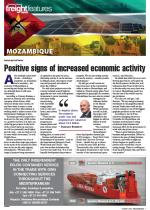Volumes are picking up at the Port of Beira after a slow start to the year.This is good news says Jan de Vries, executive managing director at Cornelder de Moçambique.“Despite the difficult months at the beginning of the year, and the global challenges facing the shipping industry, the business has proved to be resilient. We have felt the impact of the global shipping line shortages – be it ships or containers. The situation is now improving with more containers and ships available, but it will remain challenging at least until the end of the year.”With the Port of Beira relying heavily on exports, it has had its share of challenges – but they differ from those at the ports of Durban or Dar es Salaam which import more. “We normally get large quantities of empty containers discharged here for use in various exports – the likes of copper, tobacco, chrome, timber and many other exports. In the current environment shipping lines, due to the shortages in the major trade lanes, have been reluctant to send empties to Africa, limiting export capacity. He said the massive escalation in freight rates had impacted logistics everywhere. Exports were on the rise, as was the demand for containers. “We have clients who are saying give us containers and we will export even more.”To address the container shortage, Cornelder put the focus back on breakbulk and reintroduced it to the Beira port. “We have handled approximately 200 000 tons of copper in breakbulk this year. It is fundamentally very different to the container market and is slower. For copper, for example, one can load ships with 30 000 tons a day in containers compared to 3 000 tons per day if it is breakbulk.”He said despite this, the move to breakbulk had been well-received in the market. “It might not be the perfect solution but it is addressing the need in the market and we are moving commodities that would otherwise be standing still.”He said imports were also seeing some move towards breakbulk. For example, rice was nearly fully containerised, but this year the company expected to handle nearly 200 000 tons of rice in breakbulk. “It is a bit of a reverse trend away from containerisation but it is largely being driven by the current international market conditions, and we expect things to return to normal in the course of next year.”According to De Vries, the Ukraine/Russia conf lict also had an impact on Beira as the war saw fertiliser prices skyrocket. Fertiliser is traditionally imported through the Port of Beira for the agricultural sector in the hinterland. “We have seen a major drop in fertiliser imports through the port but the sulphur market is currently booming – and those volumes are significantly up.”Demand for sulphur has been on the increase in Zambia and the Democratic Republic of the Congo where mining houses have been expanding exploration and production. “There is also no reason to believe this activity in the mining sector will slow down any time soon as the demand for copper is expected to increase.”With Beira ideally placed to service the mining sector, the trend of growing sulphur imports and copper exports is not expected to decline soon.“Beira is the shortest route to market and it makes sense to use this port,” said De Vries. “At present, it is moved mostly on trucks and investment into rail solutions would be welcomed.”He said the port received its first sulphur vessel three years ago and operations were of such a standard that the number of vessels had only increased.

